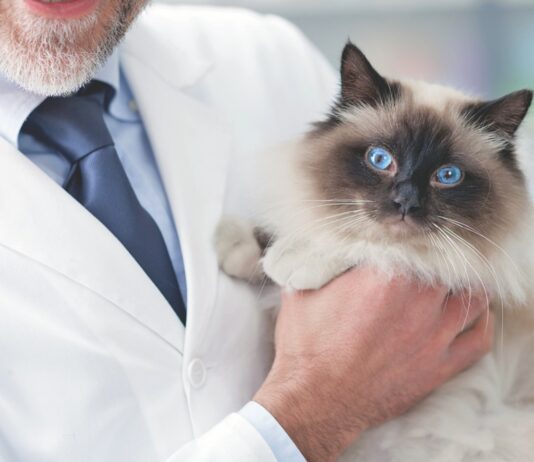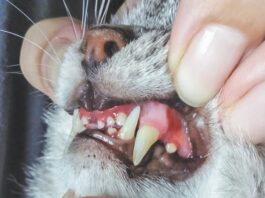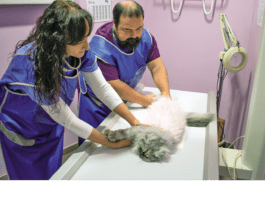5 Steps to Ease Your Cat’s Arthritis
As the cat population ages, with some living into their 20s, the number of cats diagnosed with arthritis is growing as well. Advances in veterinary medicine and better reporting may have contributed to what Banfield Pet Hospitals 2015 State of Pet Health report found was a 31 percent increase in feline arthritis in the last five years. Whatever the reason, this much is certain: early detection and owner management of their cats pain can provide a better life for cats with this incurable disease.
12 Signs of a Medical Emergency
When your cat suddenly becomes ill or injured, how do you determine if he needs to go to the veterinarian or emergency hospital - STAT? Its not always easy to tell. Hiding illness is a natural instinct for cats because of their evolution as both prey and predator. Theyre hard-wired to cloak weakness and may exhibit only subtle signs that theyre seriously sick.
Free Reign of the House and Stem Cell Research
A survey of more than 10,000 pet owners in 11 countries - 3,100 of them in the U.S. - has found that U.S. owners are the most passionate about their cats. In addition to the U.S., the renovation and design firm Houzz asked owners about pets in the home in Canada, France, Italy, Spain, Sweden, Denmark, Russia, Germany, Australia and Japan. Veterinarians frequently prescribe therapeutic diets and daily medication for cats with chronic enteropathy, a condition characterized by excessive loss of plasma proteins into the gastrointestinal tract. However, the regimen can have side effects, and some owners have difficulty complying with it.
When Cats Lose Their Sense of Balance
Seeing your once-graceful cat suddenly stumbling with his head tilted and eyes darting wildly can be frightening. These signs are associated with vestibular syndrome, a fairly common problem with a variety of causes and occasionally only temporary signs. Darting eye movements can be present at birth in blue-eyed color point breeds - those having a darker color on their tail, legs, ears and face, such as Siamese and Himalayan, but they are not related to vestibular syndrome. In the case of the syndrome, the eye movements are more likely due to an underlying condition such as infection, polyps, stroke, cancer, inflammation or drug toxicity, especially to certain antibiotics.
Managing Diabetes Requires Dedication, but Long Life Is Possible
Q: My 11-year-old male domestic shorthaired cat has just been diagnosed with diabetes. I am feeling overwhelmed by the prospect of managing this condition and concerned for his well-being. Can you tell me a bit about this condition, his prognosis and how it can be managed?
Hypertension A Threat to Cats?
Hypertension in people can damage the heart, eyes, kidneys and brain. As dangerous as it is for us, hypertension - also known as high blood pressure - can cause equally serious problems for our cats, especially those 7 years of age and older. Yet its symptoms arent always evident, even to experts. The disease is insidious, meaning signs may come on slowly or not be that apparent. Its been called the silent killer for that very reason. Cats may be a little bit lethargic or may act strangely, but in most cases its not obvious, says cardiologist Bruce Kornreich, DVM, Ph.D., ACVIM, Associate Director of the Feline Health Center at Cornell University College of Veterinary Medicine. The most important thing to keep in mind is target organ damage.
Diagnosing with Doppler and Avoiding ‘White Coat Syndrome’
Veterinarians commonly diagnose hypertension with a Doppler system that detects blood flow acoustically. This method uses an inflatable cuff with a gauge that measures pressure within it, a stethoscope and a unit that uses Doppler signals to detect blood flow. The veterinarian or technician places the cuff around a limb, inflates it until blood blood flow in the limb is blocked and then gradually deflates the cuff until blood flow is detected once again. …
Living Fully to the Last Moment
Whether your cat is suffering from disease or the effects of extreme old age, a time may come when medical treatment can no longer help. In the past, that might have meant euthanizing your cat. Today, however, veterinarians increasingly suggest hospice care as an option. Some clinics offer house calls with staff members providing hospice services, while in some cases owners decide to provide care at home under veterinary supervision.
Sounds Linked to Seizures in Older Cats and More
An evaluation of 96 cats medical records and owner questionnaires suggests that some high-pitched sounds can cause seizures in older cats. At the same time, the study uncovered a mystery: Half the evaluated cats were deaf or hearing impaired, according to their owners. How did they hear the sounds?
Sounds Linked to Seizures in Older Cats – and More
An evaluation of 96 cats medical records and owner questionnaires suggests that some high-pitched sounds can cause seizures in older cats. At the same time, the study uncovered a mystery: Half the evaluated cats were deaf or hearing impaired, according to their owners. How did they hear the sounds?
Evaluating a Transdermal Appetite Stimulant for CKD
The drug mirtazapine, used to treat depression in people, has a surprising side effect in pets: It can stimulate appetite and, in some cases, control nausea and vomiting, which are signs of chronic kidney disease (CKD) in cats.
Ask About Advantages And Drawbacks
If you want to check out a potential clinical trial for your cat, these are questions to ask his veterinarian and the studys research coordinator.













